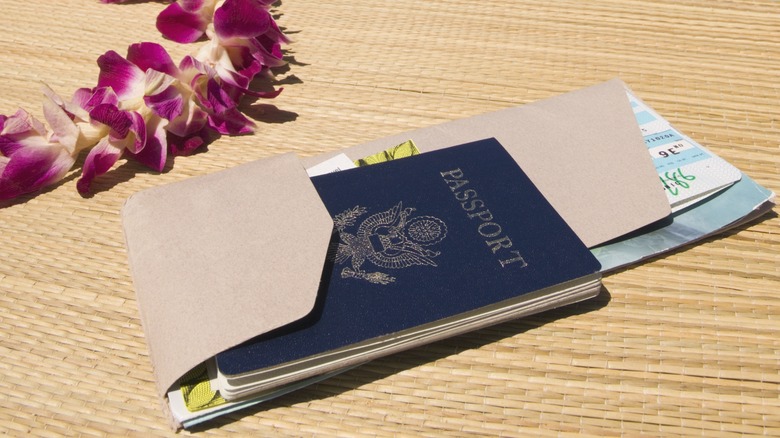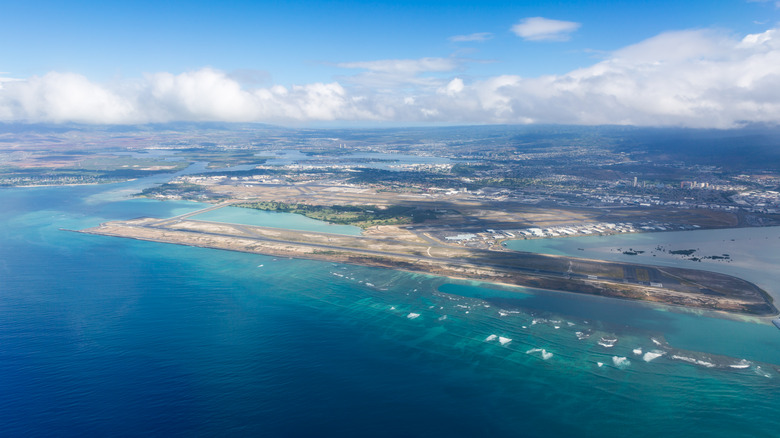Should You Bring Your Passport On Vacation To Hawaii?
It's now easier than ever for people without passports to go get one, but here's the kicker: You might not even need it, especially if you're eyeing a trip to a tropical U.S. destination like Hawaii. For those based in the mainland U.S., Hawaii might feel like a far-off mythical land, considering it's more than 2,400 miles away, with the massive Pacific Ocean in between. And unless you've got a flying car stashed in your garage, driving there isn't exactly an option, so you're left with no choice but to hop on a plane or a ship. But the good news is, unlike other far-flung locales, you don't need a passport to visit the beautiful islands of Hawaii — that is, if you're a U.S. citizen or a Legal Permanent Resident (LPR).
According to the U.S. Customs and Border Protection (CBP), since Hawaii is an official state of the U.S., you don't need to flash a passport (or green card) when you land there, making it one of the best no-passport-required vacation spots. The same goes for U.S. territories like Guam, Puerto Rico, the Northern Mariana Islands, American Samoa, and the U.S. Virgin Islands. But here's the catch: This rule only applies if you're heading to Hawaii straight from the contiguous United States or another U.S. territory.
U.S. citizens and LPRs do not need to bring passports to Hawaii — usually
U.S. citizens and LPRs get to enjoy the sweet perk of visiting all 50 states and U.S. territories without the hassle of whipping out passports or green cards. All you need is a valid ID, like your trusty driver's license or state ID. But the thing is, this only works if you're flying from the U.S. or a U.S. territory. So, if you live in Atlanta and fly out of Hartsfield-Jackson Atlanta International Airport (ATL) — the busiest airport in the entire world — straight to Hawaii, you don't have to worry about toting around your passport. It's a domestic flight, after all. But if you're from Seattle and thinking about driving to Vancouver to catch a flight to Hawaii, you'll need your passport because that's already considered international travel.
However, starting May 7, 2025, all U.S. citizens and LPRs will need to show federal-compliant REAL ID driver's licenses or state ID cards to board domestic flights, whether you're heading to Hawaii or any other U.S. state or territory. REAL IDs are those fancy licenses or state IDs with a star in the top right corner. From that date onward, no REAL ID, no boarding. But if you find yourself without a REAL ID when it's time to fly, don't panic. You can still use a passport, passport card, or a green card as a valid alternative.
You also don't need a passport for a closed-loop cruise to Hawaii
If you're heading to Hawaii on a cruise and wondering if you need to bring a passport, it mostly depends on the type of cruise you're joining. If it's a closed-loop cruise, meaning the ship departs and returns to the same U.S. port and travels only within the Western Hemisphere, then you can leave your passport at home. According to the CBP, you'll just need proof of citizenship, like an Enhanced Driver's License (EDL). However, if your Hawaii cruise stops at a foreign port or departs and arrives at different ports, you'll need to have your passport ready.
It should be noted that as of this writing, only Norwegian Cruise Line offers a closed-loop cruise within Hawaii. For other cruises that include the islands, it's very likely they're not categorized as closed-loop. "A cruise that leaves a port in the United States and goes to another port in the United States ... those don't happen very often," travel editor Peter Greenberg told CBS News, noting that it's primarily due to an existing law called the Jones Act that dictates that only U.S.-registered ships can traverse between U.S. ports, and many cruise ships are registered elsewhere. "Closed-loop cruises are really a misnomer, because while they're technically possible, nobody does them," he said. If you're planning a Hawaiian cruise, make sure to double-check your itinerary and be prepared. The last thing you want is to be left at a port because you didn't have the needed documents handy.


